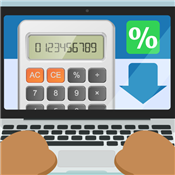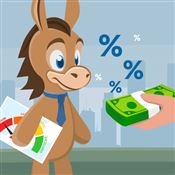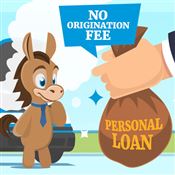How Much Can You Borrow With Personal Loan
Don't know if you can commit to the personal loan amount you have in mind? Learn how much you can borrow and calculate its terms, repayment, and interest.
 |
A personal loan is a quick and easy way to get cash if you're financially stuck. You can use the amount to pay for your debt, big purchases, and unexpected expenses.
However, you should also be smart about how much to borrow. Applying for a large loan amount can be overwhelming and leave you in more debt. On the other hand, a smaller one might not be enough to cover your needs.
With this guide, find out what affects your application, how to qualify for the maximum loan amount, and determine how much you should get without going over or under budget.
How Much You Can Get With a Personal Loan
Nowadays, you can get personal loans from a traditional lender like a brick-and-mortar bank, or in a snap with an online lender.
Online lenders offer a lower minimum for loans, ranging from $1,000 to $3,500. Meanwhile, traditional banks normally offer loans from $25,000 up to $100,000, and higher for those with great credit scores.
How Much Can You Afford to Borrow?
Before you apply for a personal loan, you should have a good idea of what you're getting yourself into. Clearly, you should only take out an amount that you are sure you can pay back.
So, how much can you afford to borrow? Consider other factors that would affect your loan total and monthly repayments, such as interest rates, your income, and loan terms.
To secure the maximum loan amount, you must evaluate what that arrangement would look like for you. If the terms are doable, then work on making a more impressive application to get approved for a high amount.
Personal Loan Calculator
It might help you assess how ready you are to commit to taking out a loan by calculating it first. Here's how to do it with our personal loan calculator:
- Input your desired loan amount
- Enter the interest rate and loan term in years
- Click "calculate" and you're done!
Our personal loan calculator can tell you your monthly loan payment, how long you'll be paying off your loan, and your loan total with interest.
How much you can borrow from lenders
Banks and loan providers require certain credit scores before granting loans. They also impose loan limits and offer different terms for loan repayment. Know how much you can borrow from reputable loan providers below.
| Personal Loan Providers | Required Credit Score | Loan Amount | Loan Terms |
|---|---|---|---|
| SoFi | 680 | $5,000 - $100,000 | 24 to 84 months |
| Avant | 600 to 700 | $2,000 - $35,000 | 12 to 60 months |
| Prosper | 640 | $2,000 - $50,000 | 24 to 60 months |
| Upstart | 300[1] | $1,000 - $50,000 | 36 to 60 months |
| Happy Money | 640 | $5,000 - $40,000 | 24 to 60 months |
| Best Egg | 640 | $2,000 - $50,000 | 36 to 60 months |
| LendingPoint | 580 | $2,000 - $36,500 | 24 to 72 months |
| Upgrade | 580 | $1,000 - $50,000 | 24 to 84 months |
| Universal Credit | 560 | $1,000 - $50,000 | 36 to 60 months |
| Discover | 660 | $2,500 - $40,000 | 36 to 84 months |
Factors Affecting Personal Loan Amount
While that gives you a range of how much money you can borrow, the amount you will be approved for will greatly depend on these three factors.
- Credit score
Your credit score is one of the first things lenders will look at when considering your application.It will reflect how reliable you are as a loanee to pay them back. Credit scores range from 300 to 850.
A credit score of 670 to 739 is considered good, but higher credit scores are better. Why? The higher your score, the better chances you have for a loan approval and for a larger amount as well.
You can still have a bad credit score with high income and minimal debt. So, always pay your debts on time to keep your credit score up.Lenders usually give favorable loan terms to those with high credit scores. Those with lower scores might still get approved for smaller loans, but with less ideal conditions.
So, it's best to check your credit score before applying for a personal loan to gauge where you're at. If you don't know how just ask your bank or credit card company. There's usually a free monthly credit score evaluation.
What's your credit score? - Income
Your annual income shows if you're earning enough to make repayments. How much you earn affects the amount you are eligible for.There's often a minimum income requirement to meet before you can get a loan. They also have to take into account how much of that goes into paying other debts. This is to see if you can still make ends meet and pay off your loans.
Depending on how much you can spare from your monthly income, the amount lenders can offer you will vary.
So, it's important to have a dependable and stable income when applying for a personal loan.
If your income isn't stable, you could still be considered for a loan despite being a high risk. Lenders could approve your application but for lower loan limits. - Current debts
Another thing lenders will consider is your current debts. They need to know if your financial circumstances are secure enough to take on another loan.They will look at two things: your debt-to-income ratio (DTI) and your credit utilization ratio.
Your debt-to-income ratio takes into account your current debts with your additional loan and how it affects your income. The lower your DTI, the better.
Strive for a DTI of 36% or lower to increase your chances of a loan approval.
To compute your DTI, add your bills and debts and divide it by your monthly income.For example: Let's say you earn $6,000 a month. You have $300 worth of bills, a $500 car payment, and $50 in credit. Your DTI will be 14.2%, or 850/6,000.
What is your current debt-to-income ratio?On the other hand, your credit utilization ratio gives lenders an idea of how you're handling your current debt. It is the amount of revolving credit you have over the amount given to you.
Here's how to compute your total credit utilization ratio: divide your total balances by the total of your card's credit limits.Say you have three credit cards with a $1,000 limit each. You owe one $250, the other $500, and the last one $100. Your overall credit utilization ratio is $850 divided by $3,000, or 28.3%
How to Qualify for a Larger Loan Amount?
While a personal loan does sound like easy money, in some cases, you may need a little more than a few thousand dollars. When that happens, you must apply for a higher loan amount.
Remember that the bigger the loan, the higher the risk is for the lender. So, they have to be more thorough in assessing your application.
To qualify for a larger loan amount, you need to work on the factors that affect your application: credit score, income, and debts.
- Improve Your Credit Score
Your credit score influences a great deal of how much you can borrow. A high credit score not only means a larger loan amount, but it can also get you lower interest rates.One thing you can do to spruce up your credit score is make all of your payments on time. Also, don't max out your credit limits if you want to get the maximum amount for your loan application.
Getting more debt can decrease your credit score. Make sure you only borrow money because you absolutely have to. Otherwise, it's better to dig into your savings or emergency funds. - Increase Your Income
If you want to apply for a higher loan amount, a sizable income will make it more attainable. Of course, you can't rely on getting an immediate raise or a sudden bonus, but there are other ways to add to this.Fortunately, there are different sources that qualify as income that you can include on your application. You can count as earnings other income sources such as side hustles, investments, or passive revenue like rental property.
- Settle Your Debts
If you still have ongoing debts, your DTI ratio could be a little high. Lenders will consider it risky to let you borrow a large amount if you have a lot on your plate already.So, settle your debts first before applying for a large loan. It makes a huge difference in your application.
- Get a Cosigner
Getting a large personal loan by yourself is quite difficult. If the odds aren't in your favor, consider getting a cosigner to up your chances.A cosigner is someone you can assign equal responsibility for your loan. Once they are on board with the loan, they are obliged to make payments in your behalf. Meaning, they need to pay your loan in full, if you, the main borrower, can't repay the balance.
Applying with a cosigner will make your case more favorable towards lenders. It gives them additional credit and income to consider when assessing your application.
Your loan cosigner can be a family member, business partner, or even a friend. Do note that both you and your cosigner are equally responsible for the loan amount. Pay your monthly dues responsibly! - Opt for a Secured Loan
Personal loans are most often unsecured, meaning they don't require collateral. Because there is nothing to back up your repayment, lenders will usually offer lower loan amounts.However, depending on the lender, you can opt for a secured loan and offer collateral. This makes you more credible and can increase the likelihood of you getting approved for a larger loan.
- Go for Longer Repayment Terms
A longer repayment term will make your loan more realistic and practical. Since it lessens the amount you have to pay monthly, it makes a higher loan more manageable.So, if you need a large sum and you need it soon, consider extending the repayment period. It makes it less of a risk to the lender. But, remember to consider the possibility of higher interest rates with this setup.
Maximum Loan Amount Dos & Don'ts
Just because you are approved for the maximum loan amount does not mean you should go ahead and take it.
Your financial standing should determine the number that fits into your budget without making things too tight.
But let's say you can take out the maximum loan amount and you really need to. While that's completely fine, here are a few dos and don'ts to keep in mind so you don't mishandle your funds.
- Do take out the maximum amount, only if:
- You have an emergency fund that covers three to twelve months of your expenses
- Your credit score is excellent (800 to 850)
- You have low DTI ratio equal to 36% or less
- You have an emergency fund that covers three to twelve months of your expenses
- Do consider using the loan to:
- Consolidate other high-interest debts in one payment
- Pay for emergency expenses or an event (e.g., hospital bills, weddings, funerals, etc.)
- Make home improvements for properties to increase their value
- Consolidate other high-interest debts in one payment
- Do make your payments automated
Banks usually have this feature on their online platforms. Instead of making the installments yourself, have your bank do it for you.Autopay pays your lender each month and you can adjust your settings anytime. This is a great way to manage your finances. It'll also make sure you don't use your budget for non-essentials while securing your repayment.
Now, let's look at the maximum loan amount don'ts:
- Don't take the maximum loan amount (despite being approved by lender) if:
- You can't manage your finances (even if your income can afford a large loan)
- You want to use the loan for non-essentials (e.g., vacations, indulgences, luxury items)
- You have to apply for other loans to pay it back
A good rule of thumb to follow when taking out a loan is checking if it will make you more financially healthy instead of putting you in a debt cycle. - You can't manage your finances (even if your income can afford a large loan)
- Don't make late payments
By now, you must already know how influential your credit score is when it comes to getting loans and other financial transactions. If you get the maximum loan amount and make late payments, your credit score is going to take a massive hit.
How to Spot a Loan Scam
As helpful as personal loans are, they're just as damaging to your financial health if you fall for a fake one. Nowadays, there are many predatory lenders looking to take advantage of those who need quick money by offering deals that are too good to be true.
It's best to be careful about where you get your finances. Make sure you're going to reliable institutions and not falling for scams by following these tips on how to spot illegitimate lenders and loan offers.
- The Loan is Too Easy to Get
Lenders are always careful about who they lend money to. If you come across one that guarantees approval or doesn't even check your credit score, income, and debt–they're probably fake. - There are No Reviews
You can learn the most from others' experience with the loan. So, look for reviews and testimonies from real people to know what it's going to be like and if it's real. - The Lender isn't Transparent
A legitimate lender would lay down all their cards and not keep anything from you. Before and during your offer, you should already have all the details that you need. A predator will have vague advertisements and probably charge you hidden fees. - The Offer isn't Realistic
It's easy to fall for personal loan scams because predators make them sound so tempting and easy to get. Review the offer thoroughly–no matter how appealing it seems–and see to it that it's reasonable. It helps to compare it to other real offers to get a feel for what it typically looks like. - Upfront Payments
When applying for a personal loan, you shouldn't have to give upfront payments before your loan approval. Scammers will falsely claim to require collateral, a credit card, or debit card before you are approved.However, some legitimate lenders will need you to pay origination fees that will be deducted from your loan.
What are origination fees?
Origination fees are upfront costs that lenders need to charge for making the loan. It usually cover the processing of your loan application or administrative service charges.Lenders can charge it in two ways:
- A percentage based on your total loan amount, or
- A flat-fee rate regardless of the amount in your application
- A percentage based on your total loan amount, or
- Signing Deadlines
Watch out for lenders who rush you to sign on. Any "promos" that might expire or offers that are one-time only are potential frauds. No professional lender would pressure you to take an offer and not give you enough time to think about it.
FAQs
What can you use a personal loan for?
Personal loans are most often used to consolidate debt, make large purchases (e.g., cars, property, appliances, etc.) and for emergency expenses.
It's better to take out personal loans for urgent matters instead of the non-essentials since this could get you deeper in debt.
What are the risks of getting a personal loan?
Getting a personal loan comes with several risks:
- High APRs if you don't have good credit
- Prepayment and origination fees
- Can increase your DTI ratio
- Can decrease your credit score
- Increases your debt
- Could make your finances unmanageable
Therefore, carefully think your loan application through before you get one. If you're not in a great place financially, it could do you more harm than good.
How easy is it to get a personal loan?
Getting a personal loan is pretty easy if you have a good credit score, stable income, and manageable debt. The length of the process will depend on the lender, but if everything's set, you can usually get your loan amount on the same day.
Bottom Line
Personal loans are a helpful financial solution if you are responsible about it. That being said, make sure you've done enough research before taking out a loan. Also, be certain you can pay it back on time.
To figure out what amount would be manageable for you to borrow, use a personal loan calculator.
When you've got all that down, work on getting a good credit score, repaying your debt, and managing your income, to make a stronger case for your approval.
References
- ^ Credit score, Retreived: 7/3/23
Write to Abby Erfe at feedback@creditdonkey.com. Follow us on Twitter and Facebook for our latest posts.
Note: This website is made possible through financial relationships with some of the products and services mentioned on this site. We may receive compensation if you shop through links in our content. You do not have to use our links, but you help support CreditDonkey if you do.
|
|
|














